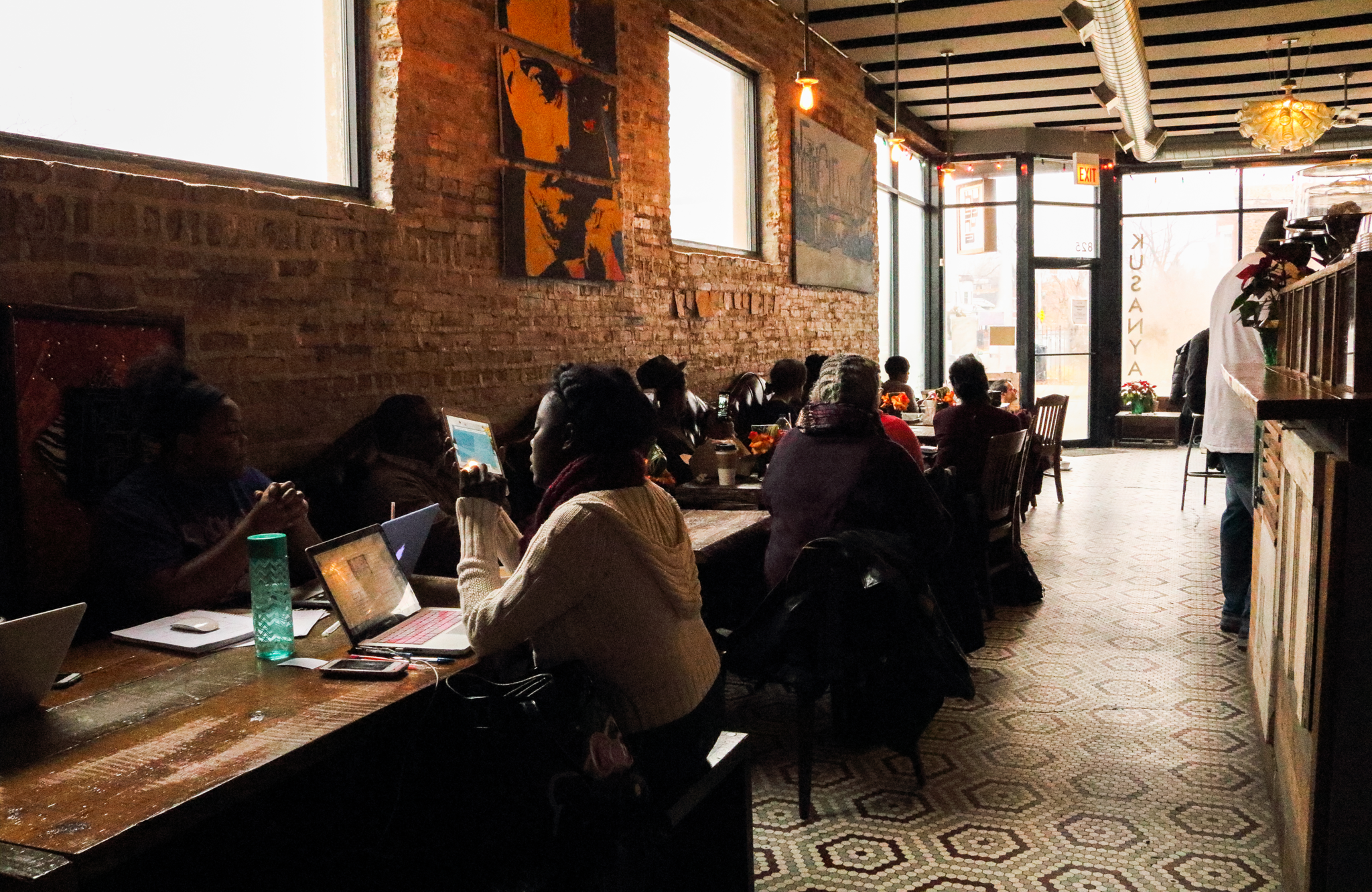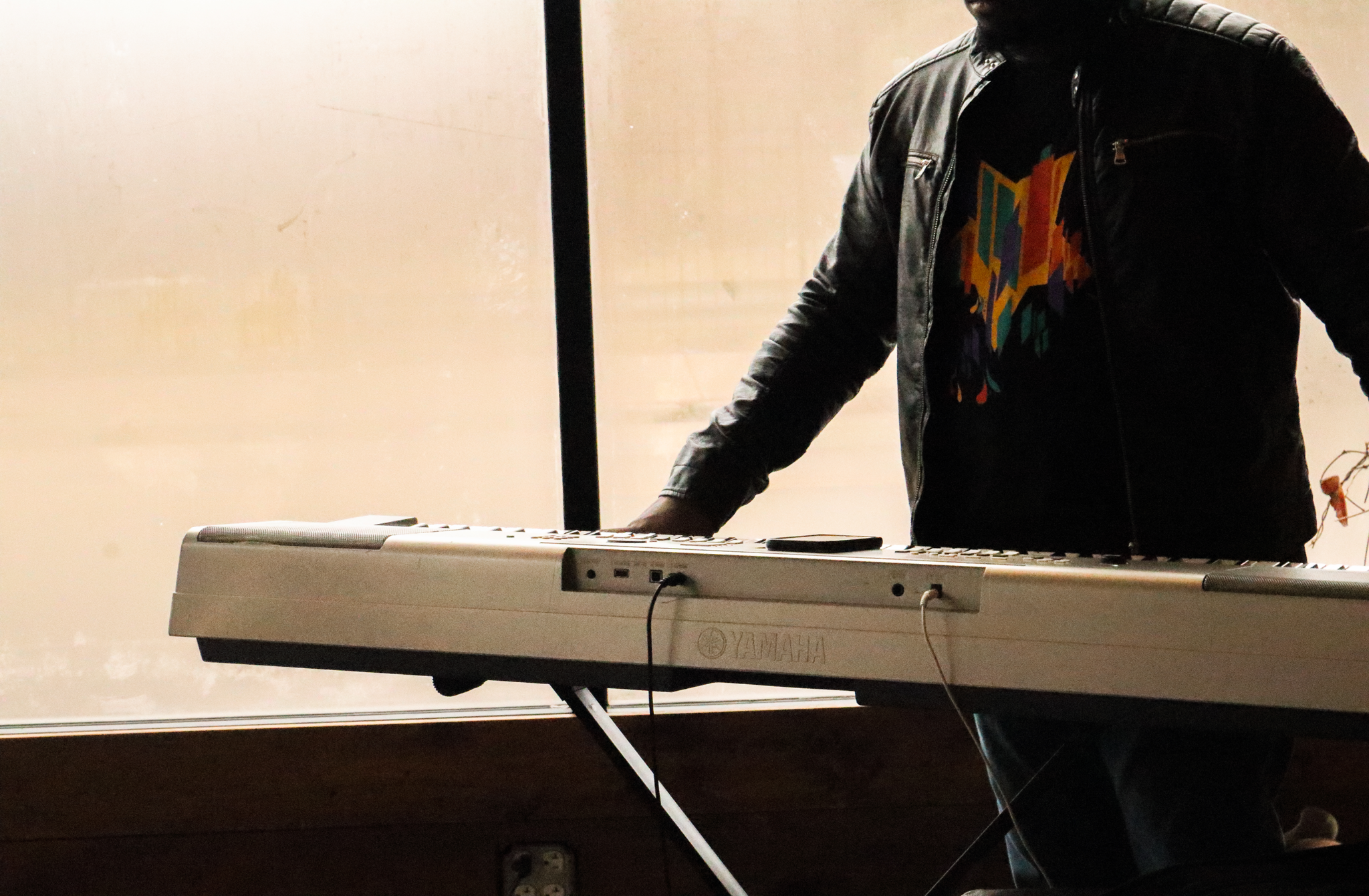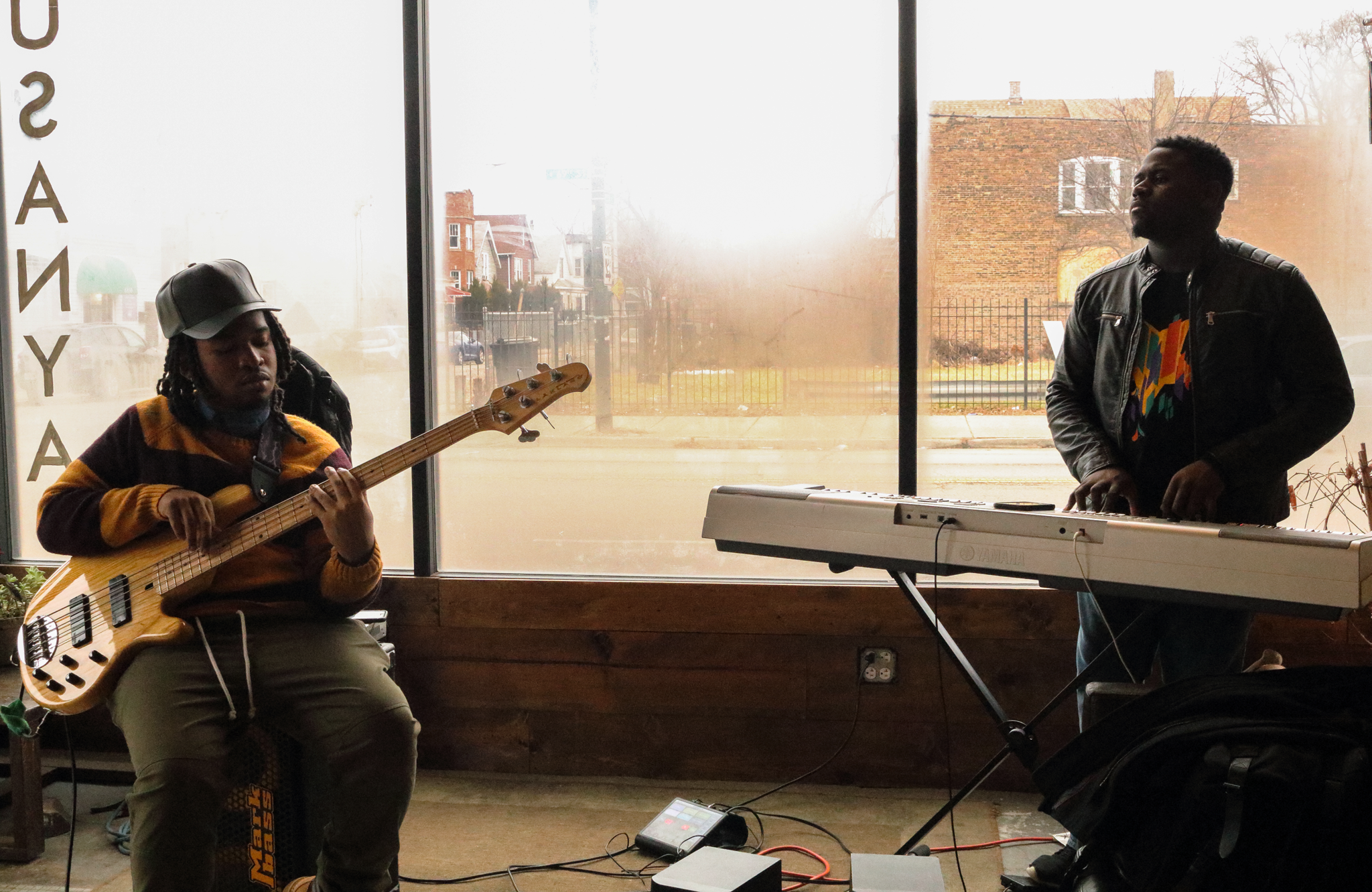It’s just after noon in Englewood, and light throws itself in bars across the floor of Kusanya Cafe as the door swings open and shut. Seated at the front window of the restaurant among light chatter and the clatter of plates, South Side local Shawnee Dez brushes her hair back from her face and goes into performance mode.
“I’m gonna sing without a mic because I just messed mine up,” she says to her audience, a small and attentive group composed of family, friends, café staff and community members. They laugh, and Shawnee lifts her chin, launching into her opening number.

Shawnee is performing at the second Sound Voyage, a music series at Kusanya featuring free lunchtime shows every second and fourth Wednesday through May. The series features artists from a multitude of genres including R&B, jazz, Afro-Latin, Brazilian, and reggae. Today, Shawnee graces us with a dreamy, melodic series of covers and originals—a sound grown from her roots. After plugging her Soundcloud EP, Day Child, Shawnee thanks her mom for teaching her.
Perched on a stool nearby, Sound Voyage’s curator Erik Jones listens intently, smiling as he watches Shawnee’s act unfold. The series was born as a podcast by Jones’s production company, the Blue Sapphire Experience. From the beginning, Jones has aimed to expose listeners to sounds they wouldn’t usually hear by combing genres familiar and foreign.
“When you’re hearing the lyrics in a language that you don’t understand, it’s something soothing…it’s a different relationship,” he said. “A lot of times people don’t get to hear reggae, or get to hear Brazilian, so it’s to help give it a more global feel.” Through this live music series in Englewood, Jones said he saw the opportunity to unite local talent and community. “I would say that Englewood wants to have a musical community,” he said.
Discussing what he sees as a neighborhood in the process of change, Jones said: “We’ve got such great organizations…you have the violence, you have some of the poverty, but there are still cells of buildings, there are people rehabbing,” he said.
“I think Englewood always knows what it wants to be,” said Jones. “I think it’s the outside that wants to invest and wants to understand how they can pull in and help, I think they’re…starting to see how they can help [the community’s] vision take shape.” He said he sees the manifestation and showcasing of local talent as a vital element of this growth, and highlighted the connections he’s been able to help facilitate. “I’ve had some people come and say to me: ‘Hey, I know some people who could do some things.’ They sing or they play jazz, but they haven’t had a great platform or they had to go outside of their community.”

When asked why he chose Kusanya Cafe to showcase local artists, Jones praised it as an outlier in the neighborhood. “It’s brought about a change in people having the ability to come just as they are, sit, talk, do their work, have a wi-fi connection,” he said. As for the intersection between space and music, he said the series was helping bring people into the social networks that Kusanya enables. “They can enjoy the food there, they can see what’s going on there, and even some people, from the first show, have had some interest in wanting to do their own events, whether it be gatherings or meetings or whatever.”
Kusanya itself is a nonprofit organization that aims to strengthen the community rather than provide a service or good. The goal of the café was always to create “intergenerational, inter-economic gathering space,” as Englewood resident and Kusanya Cafe’s executive director Phil Sipka put it. “Our mission is to be a place of empowerment and encouragement to the Englewood community, and we really thought that there’s such a wide diversity of different types of people that live in the neighborhood…in terms of economics, education, social capital,” said Sipka. “So what could we do to get the people that have a lot of resources in the neighborhood, who could be an inspiration to a lot of other people on the block… how could we get those people together in an organic way?”

That vision was expressed in 2009, which was the beginning of a four-year search for a viable space. “The city has demolished most of the commercial thoroughfares in the neighborhood. It’s mostly vacant land, it’s very few buildings to begin with,” said Sipka. “Most building owners, if they had space available, did not believe that [commerce] worked in the neighborhood, or that our vision of doing something like this would ever work.” Sipka tied these initial challenges to a greater economic problem facing entrepreneurs and investors in neighborhoods like Englewood. “Once you start doing something [like this] in a neighborhood like Englewood, you start peeling back the layers of injustice.”
Finally, a board member bought the recently rehabbed space at 825 69th Street, and in 2013 Kusanya Cafe opened. Today, it’s a non-profit striving towards self-sustainability and a bustling community establishment that brims with energy. “Things are more organically happening now,” said Sipka. “We have more and more Englewood residents getting involved in doing our events, and that’s what we wanted from the beginning…we have a lot of different people and organizations this third year coming out of the woodwork in a really good way.”
As Shawnee lets her voice trail off on the final note of “Happy Spell,” an original song from Day Child, her audience sits enraptured. Impact hangs like smoke in the air, and the audience rises to meet it with a generous round of applause, which Shawnee accepts gracefully, dipping her head a little in deference. Visible through the window behind her, a bus rolls by, and people come and go. Surrounded by pieces of a community that’s constantly in motion, Shawnee clears her throat to introduce the next song.
Did you like this article? Support local journalism by donating to South Side Weekly today.


This is awesome, Sylvia captured the essence of what I’m doing with this series. I truly appreciate you and the paper for helping us feature the music, artists and cafe.